
Johan Ludvig Runeberg was a Finnish priest, lyric and epic poet. He wrote exclusively in Swedish. He is considered a national poet of Finland. He is the author of the lyrics to Vårt land which became an unofficial Finnish national anthem. Runeberg was also involved in the modernization of the Finnish Lutheran hymnal and produced many texts for the new edition.

Väinö Alfred Tanner was a leading figure in the Social Democratic Party of Finland, and a pioneer and leader of the cooperative movement in Finland. He was Prime Minister of Finland in 1926–1927.

Kaarlo (Kalle) Alvar Päätalo was a Finnish novelist, the most popular Finnish writer in the 20th century. His Iijoki series, comprising 26 novels, is one of the longest autobiographical works ever written.

The University of Oulu is one of the largest universities in Finland, located in the city of Oulu. It was founded on July 8, 1958. The university has around 13,000 students and 2,900 staff. 21 International Master's Programmes are offered at the university. The university is often ranked as one of the best universities in Finland and in the top 400 worldwide.
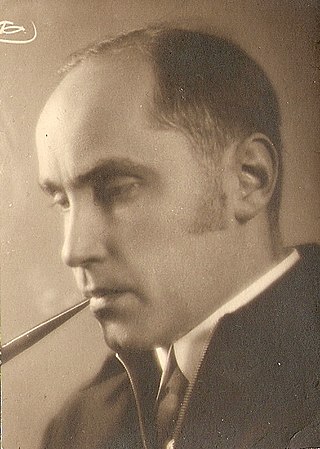
Lieutenant Colonel Paavo Susitaival, born Paavo Sivén, was a Finnish author, soldier and politician. Paavo Sivén and his brother, Bobi Sivén were prominent figures in the Finnish interwar Nationalist movement. Paavo had acquired his reputation smuggling volunteers to Germany to enlist in the 27. Imperial Jaeger Battalion; Bobi gained his by being the last alderman of Porajärvi municipality before the ratification of the Treaty of Tartu who shot himself rather than acknowledge the transfer of Porajärvi and Repola to the Soviet Union.
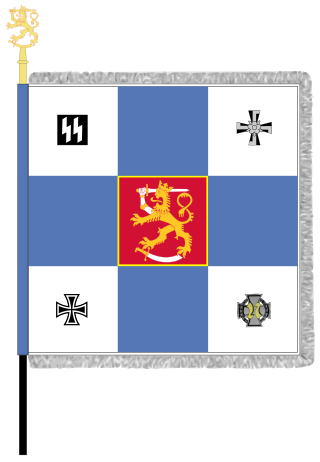
From 1941 to 1943, 1,408 Finns volunteered for service on the Eastern Front of World War II in the Waffen-SS, in units of the SS Division Wiking. Most of these volunteers served as motorized infantry in the Finnish Volunteer Battalion of the Waffen-SS. The unit was disbanded in mid-1943 as the volunteers' two-year commitment had expired and the Finnish government was unwilling to allow more men to volunteer. In 1944-1945 a company sized unit of Finnish defectors recruited to the SS continued fighting alongside Germany.

Finnish literature refers to literature written in Finland. During the European early Middle Ages, the earliest text in a Finnic language is the unique thirteenth-century Birch bark letter no. 292 from Novgorod. The text was written in Cyrillic and represented a dialect of Finnic language spoken in Russian Olonets region. The earliest texts in Finland were written in Swedish or Latin during the Finnish Middle Age. Finnish-language literature slowly developed from the sixteenth century onwards, after written Finnish was established by the bishop and Finnish Lutheran reformer Mikael Agricola (1510–1557). He translated the New Testament into Finnish in 1548.
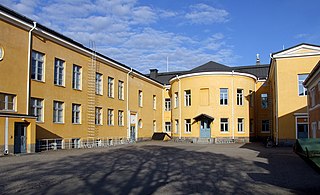
Oulun Lyseon Lukio is a Finnish upper secondary school in the city of Oulu in northern Finland. The school has over 60 teachers and about 750 students. In addition to the Finnish national curriculum the school provides the option to study the International Baccalaureate programme in English. Since 2018 Lyseo has a distance teaching campus in the small town of Tyrnävä. In 2018 255 students, of which 50 took the IB programme, were accepted to the school.

The Korisliiga is the top-tier professional basketball league in Finland, comprising the top 12 teams of the country. In its current format, each team plays all other teams two times in the regular season, once at home and once away, for a total of 22 regular season games. The top six teams advances continues to upper stage and the bottom six teams plays lower stage after 22 games, 5 games at home and 5 games at away versus all other teams in stage. The best two teams from lower group joins to playoffs with upper group teams. Playoffs are played best of seven format, except the quarter-finals which are played best of 5 format. Pantterit holds the record for the most league titles won, with 14. The top level Finnish league for women is the Naisten Korisliiga.

FC Jokerit was a Finnish professional football club based in Helsinki, Finland.

The Boys is a 1962 Finnish war drama film directed by Mikko Niskanen. It is based on a 1958 novel of the same name by Paavo Rintala. It was entered into the 3rd Moscow International Film Festival. The second lead role, Jake, was played by 17-year-old Vesa-Matti Loiri, who received the Jussi Awards certificate of honor for his role as a young actor.

Vilho Henrik Lampi was a Finnish painter who is best known for his self-portraits and paintings of Liminka and the people who lived there.
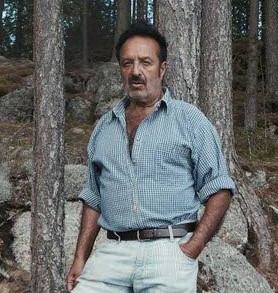
Veija "Veijo" Oskari Baltzar is a Romani author and visual artist from Finland.

The Awakening is a Lutheran religious movement in Finland which has found followers in the provinces of Savo and Ostrobothnia. The origins of the movement are in the 18th century. It has functioned inside the Evangelical Lutheran Church of Finland throughout its existence. Formerly very pietist, the movement is currently considered within mainstream Finnish Lutheranism.

Koillismaa is a subdivision of Northern Ostrobothnia and one of the Sub-regions of Finland since 2009.
Pojat, the Finnish word for boys, may refer to:
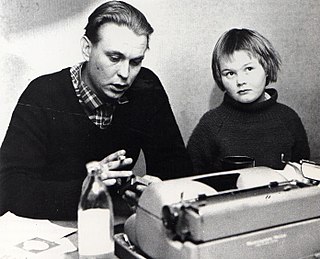
Paavo Olavi Rintala was a Finnish novelist and theologian. He also wrote theatre pieces, radio plays and prose.

Break Sokos Hotel Eden was a spa hotel located in the Hietasaari district, 4.5 kilometres (2.8 mi) west of Oulu Centre in the Nallikari camping area. This Finland subtropical sea spa was constructed in 1989 by the designer Paavo Karjalainen.

Oulujoki is a former municipality of Finland. The municipality had a population of 5,230 (1963) and covered a land area of 606.1 square kilometres (234.0 sq mi). Its neighbouring municipalities were Kempele, Kiiminki, Muhos, Oulu, Tyrnävä, Utajärvi and Ylikiiminki. The municipality was named after the river Oulujoki.
Otso-Pekka Parkkila is a Finnish professional footballer playing as a full back for Veikkausliiga club AC Oulu.


















